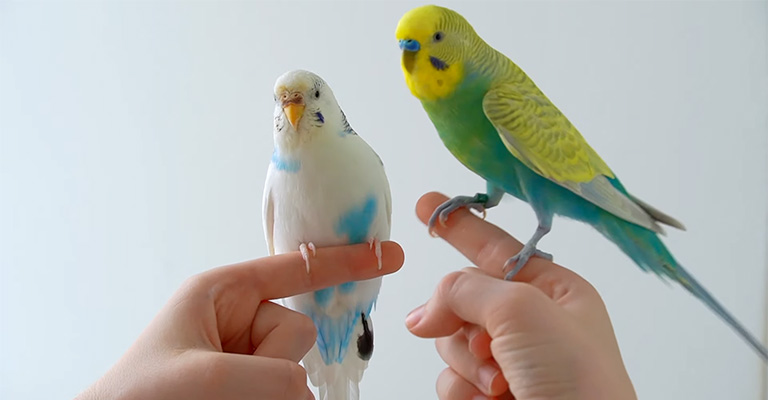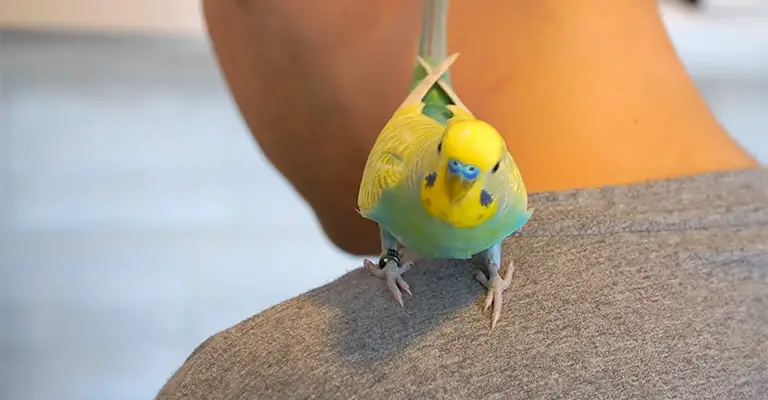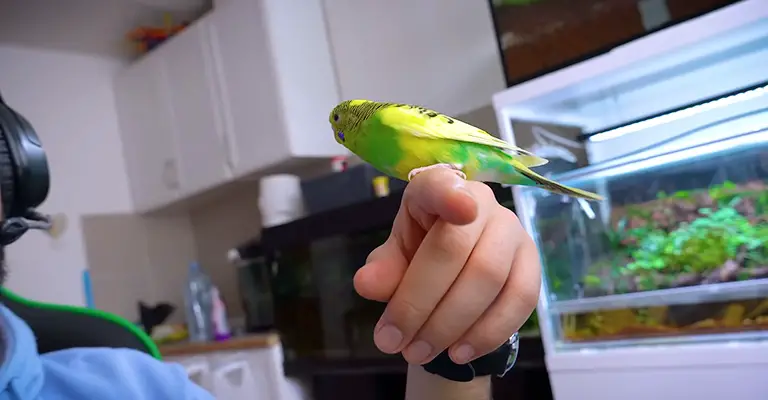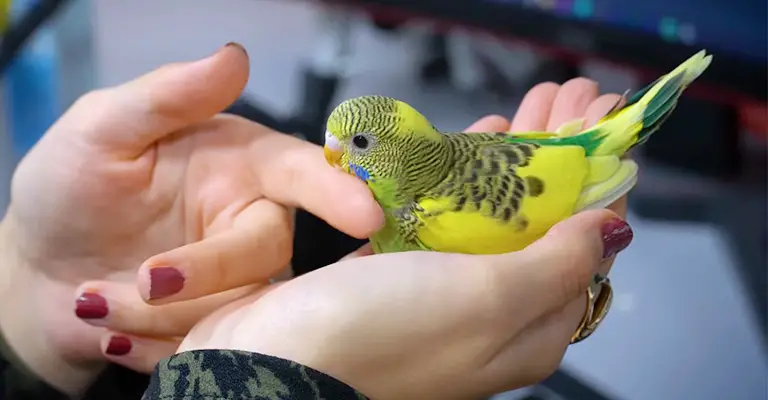Budgies, those small and captivating avian wonders, have a way of leaving a lasting impression with their cheerful chirps and vibrant plumage. But does their charm extend beyond their colorful feathers? Do budgies get attached to their owners?
If you’ve ever wondered whether budgies truly forge bonds with their human caretakers, you’re about to delve into a realm of avian companionship that’s as heartwarming as it is intriguing.
In this exploration, we embark on a journey to uncover the depths of attachment that budgies might form with the humans who care for them.
From chirping greetings to perching on a friendly finger, we seek to understand the unique dynamics that define the connection between these feathered beings and the hands that feed, interact, and provide them with a home.

Do Budgies Get Attached to Their Owners?
Budgies do indeed have the capacity to form attachments to their human owners, and they often do so through a combination of behaviors and interactions. Here’s how budgies develop attachments to their owners:
Social Nature
Budgies are naturally social birds that live in flocks in the wild. When kept as pets, they perceive their human caretakers as part of their social circle, and over time, they learn to recognize and respond to individual humans.
Consistent Interaction
Regular and positive interaction with their owners lays the foundation for attachment. Spending time near their cage, talking to them, offering treats, and engaging in playtime help them associate humans with positive experiences.
Trust-Building
Budgies are sensitive to the intentions and actions of their owners. Consistency, patience, and gentle handling help them build trust in their human companions.
Vocal Recognition
Budgies often learn to recognize the voices of their owners. They might chirp or become excited when they hear your voice, indicating that they associate your presence with companionship.
Physical Contact

Gradually, budgies that have formed attachments may allow physical contact, such as stepping onto your finger. This is a significant sign of trust and attachment.
Preening Behavior
Budgies might groom themselves and you as a sign of affection. If your budgie starts preening your hair, clothes, or even your fingers, it’s a sign that they consider you part of their flock.
Seeking Attention
Attached budgies often seek attention from their owners by hopping to the front of their cage, flapping their wings, or chirping in a cheerful manner.
Following You
Some budgies might follow their owners around the room or move to the side of the cage closest to where you are. This behavior demonstrates their desire to be near you.
Vocal Interactions
Budgies that are attached might engage in “conversations” with their owners, mimicking sounds, whistling, or even repeating words they’ve learned.
Relaxed Behavior
An attached budgie will exhibit relaxed behavior in your presence, such as perching comfortably, fluffing their feathers, and displaying a calm demeanor.
Emotional Bond
Over time, the attachment deepens into an emotional bond where the budgie displays joy, trust, and a sense of security when interacting with its owner.
It’s important to note that the degree of attachment can vary from budgie to budgie. Some might become very attached and affectionate, while others may be more reserved.
Building an attachment with your budgie requires consistent, patient, and positive interactions that nurture a sense of security and companionship over time.
How Long Does It Take for Budgies to Get Attached to Their Owners?

The time it takes for budgies to get attached to their owners can vary widely based on several factors. Building a strong bond with your budgie requires patience, consistent interaction, and understanding of their individual personalities.
Here are some factors that can influence the speed at which budgies become attached to their owners:
Age
Younger budgies tend to be more adaptable and open to forming attachments compared to older ones. However, older budgies can also develop strong bonds with patience and time.
Previous Experience
Budgies that have had positive experiences with humans in the past are more likely to warm up to their new owners faster.
Socialization
Budgies that have been well-socialized with humans from a young age are more likely to become attached sooner. Hand-raised or hand-fed budgies tend to be more comfortable around people.
Personality
Just like humans, budgies have unique personalities. Some are naturally more outgoing and sociable, while others might be more reserved. A budgie’s innate temperament plays a significant role in the attachment process.
Trust Building
Building trust is crucial for attachment. Gradually introducing your presence, offering treats, and moving at their pace helps them feel safe and comfortable.
Consistency
Consistent interaction is key. Spending time with your budgie every day, even if it’s for short periods, helps establish familiarity and trust.
Positive Experiences
Positive interactions, such as offering treats, engaging in gentle play, and providing a calm environment, create positive associations with your presence.
Respect for Boundaries
Allowing your budgie to set the pace for interactions helps prevent overwhelming or scaring them. Respect their comfort zones and gradually increase interaction as they become more comfortable.
Proper handling and taming techniques play a role. Gentle and non-threatening approaches help build trust faster.
Home Environment
A calm and quiet home environment provides a conducive atmosphere for attachment. Loud noises, sudden movements, or stressful surroundings can hinder the process.
Other Budgies
If you have multiple budgies, their interactions with each other can influence how quickly they bond with humans. Some budgies might seek companionship from their fellow birds initially.
Patience
Attachment takes time, and rushing the process can lead to setbacks. Patience is essential to allow your budgie to feel comfortable and build trust at their own pace.
In general, it can take anywhere from a few weeks to several months for budgies to become attached to their owners. The key is to establish a foundation of trust and positive experiences while being attuned to your budgie’s personality and needs.
With time, patience, and consistent efforts, you can build a strong and meaningful bond with your feathered companion.
How Do You Tell If Your Budgie Is Bonded to You?

Recognizing whether your budgie is bonded to you involves observing their behavior and interactions. While each budgie’s personality is unique, there are several signs that can indicate a strong bond between you and your feathered friend:
Vocal Recognition
Your budgie might chirp excitedly or make joyful noises when they hear your voice. They recognize you as a friendly presence and may respond to your talking or whistling.
Approaching You
A bonded budgie might readily approach you when you come near their cage. They may hop closer, perch on the side of the cage nearest to you, or even fly to your shoulder if they’re comfortable with it.
Preening Behavior
Budgies engage in mutual preening as a sign of affection and social bonding. If your budgie gently preens your hair, clothes, or fingers, it’s a clear indication of their attachment to you.
Seeking Attention
Bonded budgies actively seek your attention. They might flap their wings, bob their heads, or engage in playful behaviors to get your focus.
Perching on You
A significant sign of bonding is when your budgie is comfortable perching on your finger, hand, or shoulder. This indicates a high level of trust.
Following You
Some bonded budgies might follow you around the room or move closer to your location within their cage. This demonstrates their desire to be near you.
Relaxed Behavior
Bonded budgies are generally relaxed and at ease in your presence. They may fluff their feathers, close their eyes, and perch comfortably, showing that they feel safe and secure.
Interacting During Playtime
During supervised playtime outside the cage, a bonded budgie might choose to fly to you, perch on your hand, or explore your clothing.
This behavior highlights their comfort with you. A bonded budgie will eagerly take treats from your hand, showcasing their trust in you.
Emotional Connection
Over time, a bonded budgie’s behavior will reflect an emotional connection. They might display excitement, happiness, and a sense of security when they’re around you.
Remember that building a strong bond takes time, and not all budgies will exhibit these behaviors immediately. Some might be more reserved in their expressions of attachment. Respect your budgie’s individuality and allow the relationship to develop naturally.
The more you invest in building trust, providing positive experiences, and spending quality time together, the stronger your bond with your budgie will become.
FAQs
Yes, budgies can form attachments to multiple people within their environment. However, the strength of their attachment might vary based on the quality and frequency of interaction with each person.
Yes, budgies can form attachments to both humans and other budgies. They have the capacity to establish multiple social bonds within their flock, which can include both humans and fellow birds.
The time it takes for a budgie to bond with its owner can vary widely. It might take anywhere from a few weeks to several months, depending on factors like the budgie’s age, previous experiences, personality, and the consistency of interaction.
Yes, even bonded budgies retain some level of independence. While they seek companionship and interaction, they also have their own behaviors and activities. Striking a balance between bonding time and allowing independent play is important.
While bonded budgies are generally more social and affectionate, there is a potential for them to exhibit territorial or aggressive behavior, especially during hormonal periods.
Proper training, socialization, and understanding of their cues can help manage and prevent such behaviors.
Conclusion
As we conclude our journey, the evidence is clear: budgies are not just colorful ornaments in our lives; they are feathered friends who can form profound attachments with their human companions.
The delicate interactions, the subtle gestures, and the shared moments weave a tapestry of connection that transcends the boundaries between species. From the gentle preening sessions to the joyous chirps of recognition, budgies reveal their attachment through their behaviors.
In a world where connections are cherished and relationships are celebrated, the bond between budgies and their owners stands as a symbol of the beauty that can blossom when two beings from different worlds come together in friendship.
As you continue to care for and engage with your budgie companion, remember that you’re not just providing for their needs; you’re nurturing a bond that enriches both your lives in ways that only true friendship can.